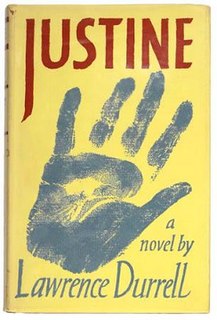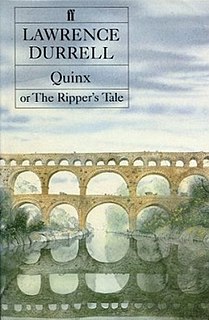| Author | Lawrence Durrell |
|---|---|
| Country | Great Britain |
| Language | English |
| Series | The Avignon Quintet |
| Genre | Novel |
| Publisher | Faber & Faber (UK) & Viking (US) |
Publication date | 1992 |
| Media type | Print (Hardback & Paperback) |
| Pages | 1376 p. (Faber edition) |
| ISBN | 0-571-22555-1 (paperback edition) |
| OCLC | 173163835 |
| Preceded by | The Revolt of Aphrodite |
| Followed by | Caesar's Vast Ghost |
The Avignon Quintet is a five-volume series of novels by British writer Lawrence Durrell, published between 1974 and 1985. The novels are metafictional. He uses developments in experimental fiction that followed his The Alexandria Quartet (1957-1960). The action of the novels is set before and during World War II, largely in France, Egypt, and Switzerland.

Lawrence George Durrell was an expatriate British novelist, poet, dramatist, and travel writer. He was the oldest brother of naturalist Gerald Durrell.

The Alexandria Quartet is a tetralogy of novels by British writer Lawrence Durrell, published between 1957 and 1960. A critical and commercial success, the first three books present three perspectives on a single set of events and characters in Alexandria (Egypt), before and during the Second World War. The fourth book is set six years later.

World War II, also known as the Second World War, was a global war that lasted from 1939 to 1945. The vast majority of the world's countries—including all the great powers—eventually formed two opposing military alliances: the Allies and the Axis. A state of total war emerged, directly involving more than 100 million people from over 30 countries. The major participants threw their entire economic, industrial, and scientific capabilities behind the war effort, blurring the distinction between civilian and military resources. World War II was the deadliest conflict in human history, marked by 50 to 85 million fatalities, most of whom were civilians in the Soviet Union and China. It included massacres, the genocide of the Holocaust, strategic bombing, premeditated death from starvation and disease, and the only use of nuclear weapons in war.
Contents
The novels feature multiple and contradictory narrators, often with each purporting to have written the others as characters in a novel. The thematic materials range from a form of Gnosticism [1] blended with Catharism, obsession with mortality, Nazism, and World War II to Holy Grail romances, metafiction, Quantum Mechanics, [2] and sexual identity.
Gnosticism is a modern name for a variety of ancient religious ideas and systems, originating in Jewish-Christian milieux in the first and second century AD. These systems believed that the material world is created by an emanation or 'works' of a lower god (demiurge), trapping the divine spark within the human body. This divine spark could be liberated by gnosis, spiritual knowledge acquired through direct experience. Some of the core teachings include the following:
- All matter is evil, and the non-material, spirit-realm is good.
- There is an unknowable God, who gave rise to many lesser spirit beings called Aeons.
- The creator of the (material) universe is not the supreme god, but an inferior spirit.
- Gnosticism does not deal with "sin," only ignorance.
- To achieve salvation, one needs gnosis (knowledge).

Catharism was a Christian dualist or Gnostic revival movement that thrived in some areas of Southern Europe, particularly what is now northern Italy and southern France, between the 12th and 14th centuries. The followers were known as Cathars and are now mainly remembered for a prolonged period of persecution by the Catholic Church, which did not recognise their belief as being Christian. Catharism appeared in Europe in the Languedoc region of France in the 11th century and this is when the name first appears. The adherents were sometimes known as Albigensians, after the city Albi in southern France where the movement first took hold. The belief system may have originated in Persia or the Byzantine Empire. Catharism was initially taught by ascetic leaders who set few guidelines, and, thus, some Catharist practices and beliefs varied by region and over time. The Catholic Church denounced its practices including the Consolamentum ritual, by which Cathar individuals were baptized and raised to the status of "perfect".
National Socialism, more commonly known as Nazism, is the ideology and practices associated with the Nazi Party – officially the National Socialist German Workers' Party – in Nazi Germany, and of other far-right groups with similar aims.
The five novels are:

Monsieur, or The Prince of Darkness (1974), is the first volume in Lawrence Durrell's The Avignon Quintet. Published from 1974 to 1985, this sequence of five interrelated novels explore the lives of a group of Europeans before, during, and after World War II. Durrell uses many of the experimental techniques of metafiction that he had integrated into his Alexandria Quartet, published 1957 to 1960. He described the later quintet as a quincunx.

Livia, or Buried Alive (1978), is the second volume in British author Lawrence Durrell's The Avignon Quintet, published from 1974 to 1985. Durrell has described the novels as "roped together like climbers on a rockface, but all independent. .. a series of books through which the same characters move for all the world as if to illustrate the notion of reincarnation." The first novel of the quincunx, Monsieur, received the James Tait Black Memorial Prize in 1974.

Constance, or Solitary Practices (1982) is the central volume of the five novels of Lawrence Durrell's The Avignon Quintet, published from 1974 to 1985. It was nominated for the Booker Prize in 1982. Involving some of the characters from the preceding Livia, the novel also introduces new ones. It is set before and during World War II, in France, Egypt, Poland and Switzerland.
Durrell often referred to the work as a "quincunx." He described them as "roped together like climbers on a rockface, but all independent... a series of books through which the same characters move for all the world as if to illustrate the notion of reincarnation." [3]

A quincunx is a geometric pattern consisting of five points arranged in a cross, with four of them forming a square or rectangle and a fifth at its center. It forms the arrangement of five units in the pattern corresponding to the five-spot on six-sided dice, playing cards, and dominoes. It is represented in Unicode as U+2059⁙FIVE DOT PUNCTUATION or U+2684⚄DIE FACE-5.
The books were not published together as The Avignon Quintet until 1992, two years after Durrell's death in 1990. They were described as a quincunx in the first edition of Quinx. The notion of the quincunx challenges any linear approach to the novels, which is reflected in their stylistic features. The character of Livia may be modeled in part on Unity Mitford, one of the well-known Mitford sisters and a prominent supporter of fascism and friend of Adolf Hitler.

Unity Valkyrie Freeman-Mitford was a British socialite best known as a devotee of Adolf Hitler. Both in Great Britain and Germany, she was a prominent supporter of Nazism, fascism and antisemitism, and belonged to Hitler's inner circle of friends. Following the declaration of World War II, Mitford attempted suicide in Munich, and was officially allowed safe passage back to England in her invalid condition, but never recovered.








